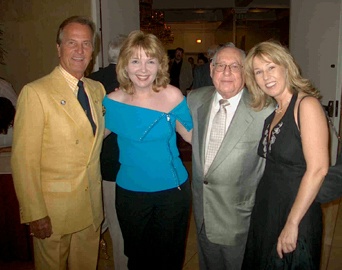Курс
О Нас
история развития компании
|
|
|
|
|
|
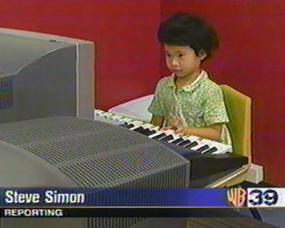 |
|
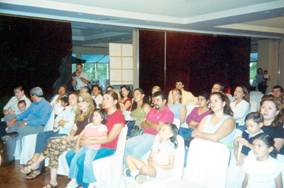 |
|
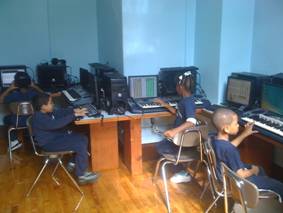 |
|
10 апреля 2000 –Американское региональное телевидение ABC транслирует передачу с популярной ведущей – Debra Dunkan . В прямом эфире приводят замечательные результаты обучения с программой Софт Моцарт, с помощью которой дети проходят обучение в школе, где к Елена Hiner проводит групповые занятия фортепиано, и отдельно с каждым учеником . Елена Hiner разработала программное обеспечение , в котором сосредоточены ее методы обучения , что делает музыкальное образование доступно любому человеку .
Август 2001 г. – Елена Hiner начинает работу над программным проектом. Hiner выделяет начальное финансирование для проекта.
Январь 2002 г. - Полные спецификации игр для ПК .
Март 2002 –Подача предварительной заявки на патент .
11 октября 2002 - " Софт Моцарт " ® представлена в новостях WB39, как инновационный прорыв в области программного обеспечения музыкального образования.
Октябрь 2003 –Собирается прототип учебной программы для " Софт Моцарт "
2004 - Государственный Совет сертификации Педагогов ( ЦМП ) утверждает " Софт Моцарт " ® в качестве поставщика курсов повышения квалификации профессионального образования (CPE) деятельности.
2004 –Открыта школа « Софт Моцарт " ® в Сан-Диего , штат Калифорния.
Август 2004 – Начальная школа Хьюстона, штат Техас, получает гранты и реализует « Софт Моцарт» учебную программу, для занятий после школьной программы для неблагополучных детей.
7 ноября 2004 - Хан- ТВ транслируется программа «36 кадров в Остине» , в которой трехлетняя Грейси Ni играет рождественские песни двумя руками , а также семнадцатилетняя Хейли Франк играет вальс Хачатуряна , чем демонстрируют замечательные результаты программы для студентов всех возрастов.
7 июня 2005 года газета «HoustonChronicle» помещает на титульном листе статью о успехах программы Софт Моцарт.
2 марта 2005 –Телевизионная компания CBS показывает кадры на которых трехлетняя Грейси Ni играет менуэт Баха- ре минор после десяти месяцев занятий с программой Софт Моцарт.
2005 - " Софт Моцарт " ® утверждается Министерством образования Великобритании в качестве поставщика программного обеспечения для обучения музыке, как Интернет государственная программа .
2005 –Первая школа " Софт Моцарт " ® открывается за рубежом - Мадрид, Испания -150 студентов.
2006 - « Софт Моцарт " ® одобрен выдающимися музыкальными исполнителями и педагогами- Юрий Розум (Россия) и Виктория Лопес (Мадрид).
2006 г. - Первые педагоги проходят обучение через " Софт Моцарт " ® Программа сертификации учить " Софт Моцарт " ® учебной программы в студии в России , Испании, Португалии , Израиле, Коста-Рике и Канаде. Студии впоследствии получать внимание средств массовой информации из местных радиостанций новостей и журналов.
Октябрь 2007 -статья « Компьютерный путь к Моцарту " опубликована в книге выпущенной Московской консерваторией под названием - «Как преподавать сольфеджио в 21 веке» .
2008 - Дополнительные " Софт Моцарт " ® студии открываются в Германии, на Украине и Норвегии.
2009 году - более 2000 программ были проданы по всему миру только по отличным отзывам людей ранее купивших программу . Возврат продукции составляет менее 1 %.
Апрель 2009 - Восемь первичных патентных заявок допускаются к экспертам Патентного ведомства Соединенных Штатов.
Мая 2009 г. -Опрос, проведенный компанией среди опытных преподавателей музыки из тринадцати различных стран обуславливает чрезвычайно благоприятные результаты для " Софт Моцарт " ® по сравнению с традиционными методами обучения фортепиано .
Сентябрь 2009 Год - в католической школе в Гарлеме- штат Нью-Йорк, принимается " Софт Моцарт " ® в качестве основной учебной программы обучения музыке. Один учитель музыки с помощью программы Софт Моцарт может проводить обучение 30 учеников всех возрастов в одном классе одновременно. Каждый в школе (более 300 учащихся) успешно учится играть на фортепиано и читать ноты .
8 декабря 2009 - Патентное ведомство США по вопросу Патента № 7629527 . Все основные заявки , которые являются основой изобретения, принимаются без ограничений.
25 февраля 2013 Елена Хайнер , объявила, что ей были предоставлена полные и окончательные права на ее изобретение – программу Soft waytoMozart ® и была основана компания - Music Vision International LLC. После длительного судебного процесса , окончательное решение которого было вынесено на основе выводов жюри присяжных заседателей 25 февраля 2013 года в 270м- округе судебной палаты районного суда Harris county, штата Техас. Елена Хайнер получила полный контроль над ее интеллектуальной собственностью.
Хьюстон , штат Техас, USA –
Декабрь 10, 2013
Известный Американский музыковед Елена Хайнер, разработки которой получили известность в 52 странах мира, получила уведомление Министерства Культуры РФ от 20 ноября 2013г за подписью заместителя министра культуры России Григория Ивлиева о том, что элементы ее исследований, учебного курса и Программного обеспечения "Soft way to Mozart» ® были рекомендованы для использования в российских дошкольных учреждениях, музыкальных классов государственных школ и школ для детей с ограниченными возможностями. Елена Ханер, изобретатель и патентообладатель Азбучного и Интерактивного нотного стана (патент США 7629527) проживает сейчас в Хьюстоне, штат Техас,США.
Эта новость произвела фуррор в музыкально-академическом сообществе России. В свете данных событий, презентация программы Елены Хайнер на XII Международной конференции «Современная музыка Образование» 4 декабря 2013 года для профессоров музыкальных вузов России и других стран прошла успешно. В своем докладе Хайнер подчеркнула, что ее модификации Нотного стана не идет против традиционных и классических подходов преподавания музыки. На самом деле, программа просто является эффективным, интерактивным дополнением к существующим подходам, разработанной в течение нескольких столетий Русской Школой Музыки.
Руководитель кафедры «Музыкально-компьютерные технологии» РГПУ им. А.И. Герцена, доктор педагогических наук, профессор, почётный работник высшего профессионального образования Ирина Борисовна Горбунова от лица Педагогического Университета имени Герцена выступила со следующим заявлением: “Мы – сотрудники учебно-методической лаборатории «Музыкально-компьютерные технологии» Российского государственного педагогического университета им. А.И. Герцена горячо поддерживаем творческую, просветительскую, научно-педагогическую деятельность музыковеда и педагога Е. Хайнер. Готовы обратиться с письмом поддержки, т.к. знакомы с её методикой, которую по возможности широко рекламируем среди наших учеников."
Государственный Университет имени Герцена собирается использовать учеьный курс Елены Хайнер как программное начиная с января 2014 года, чтобы обеспечить подготовку кадров и повышение квалификации новых поколений учителей музыки. Обучение будет проводится как непосредственно в музыкальной лаборатории университета, так и удаленно через Интернет в РФ и других странах мира.
О Елене Хайнер:
Елена Хайнер родилась в России и получила высшее музыкальное образование по специальности – музыковед, преподаватель и музыкальный критик. Она автор запатентованного курса обучения музыке с помощью фортепиано и основатель компании Vision International LLC.
Государственный едагогический Университет им. Герцена (Санкт-Петербург, Россия) был основан в 1797 году и является одним из старейших и крупнейших вузов России, сочетающий в себе черты классического российского образования со всей динамикой постоянно развивающейся континуума мирового образования.
Об Ирине Борисовне Горбуновой:
Ирина Борисовна Горбунова является руководитель УМЛ «Музыкально-компьютерные технологии» РГПУ им. А.И. Герцена, доктором педагогических наук, профессором, почётным работником высшего профессионального образования РФ. И.Б. Горбунова асновала первую в РФ кафедру "музыкально-компьютерных технологий", которая в настоящее время является лидером разработок клмпьютеризции в обучении музыки России и ближнего зарубежья.
О Григории Петровиче Ивлиеве
Г.П. Ивлиев является заместителем министра культуры Российской Федерации с 26 октября 2011 года.
В настоящее время компания MusicVisionInternationalLLC продолжает развивать свои производственные линии , ведутся разработки по линии Музыкальной Академии и интерактивного учебного плана для студентов и преподавателей.
На добровольных началах был создан Родительско-Учительский комитет. В нем объединились родители учеников и учителя преподающие по программе Софт Моцарт . Главной целью этого комитета стала помощь компании MusicVisionInternationalLLC в выполнении миссии по повышению музыкальной грамотности во всем мире. Обучение по интернету предлагает людям всех возрастов и способностей очень весело и экономически эффективным способом научиться играть на фортепиано и читать ноты. Мы хотим создать культуру, в которой музыкальная грамотность повышает успеваемость для учащихся всех возрастов, и которая является частью пути к программе Софт Моцарт .
Информация о компании
Company Contact Information
Music Vision International LLC
15131 New Hastings Dr.
Houston TX 77095 USA
Phone: +1 713-443-8984 (Mon-Fri 9am-6pm Central Time)
Questions and information about our products and programs
Этот адрес электронной почты защищён от спам-ботов. У вас должен быть включен JavaScript для просмотра.
Technical support
Этот адрес электронной почты защищён от спам-ботов. У вас должен быть включен JavaScript для просмотра.
Company Policies
PAYMENT METHODS
We accept Visa, MasterCard and PayPal on our secure server over the Internet.
SALES TAX
We do not charge any sales tax for purchases shipped outside of Texas.
We charge the sales tax in amount of 8.25% on purchases shipped to addresses inside of Texas.
SHIPPING
FOR 48 US STATES:
All orders within the domestic US are shipped with USPS First Class or Priority mail with delivery confirmation depending on weight and cost.
Orders shipped with USPS Priority mail normally arrive in 2-5 days, First class mail in 3-7 days.
Please contact us for other mail options.
SHIPPING TO ALASKA, HAWAII AND PUERTO RICO:
Actual charge of USPS Priority mail with delivery confirmation.
Please contact us for prices and other mail options.
RETURN POLICY
30-Day money back guarantee and full customer satisfaction policy.
You may return any item within 30 days of purchase for a full refund (less any shipping costs).
ORDER CANCELLATION
If you would like to cancel your order, please, e-mail us same day. If your package has been already shipped, refund will be processed after your return received, less shipping fee.
UNDELIVERABLE PACKAGES
All packages returned to us undeliverable or refused will be refunded less shipping fee. Any packages re-shipped out will require additional shipping charges.
DISCLAIMER
All prices and product availability are subject to change without notice. Due to the nature of our business the price you pay today may be different at a later date. Unless stated, prices do not include shipping and applicable sales taxes.
All software sold by Music Vision Intl LLC is guaranteed against defects for 30 days from the date of the invoice. Except as expressly stated herein, Music Vision Intl LLC makes no representations or warranties, either expressed or implied, of any kind with respect to products sold on the Music site, including but not limited to merchantability and fitness for a particular purpose.
You agree that the sole and exclusive maximum liability to Music Vision Intl LLC arising from any product sold on the Music Vision Intl LLC site shall be the price of product ordered. In no event shall Music Vision Intl LLC, its directors, officers, employees and/or other representatives be liable for any damages of any kind, including without limitation, direct, indirect, compensatory, special, consequential, incidental and/or punitive damages related to the products sold.
Media/News
International TV stories about Soft Mozart
Links to some of the TV stories about Soft Mozart:
USA - http://www.youtube.com/playlist?list=PLD268DE52009D9B98
Spain - http://www.youtube.com/watch?v=_J2EfdHe3GY
Russia: http://www.youtube.com/playlist?list=PLF177C54420E3BB71
Ukraine http://www.youtube.com/playlist?list=PL0ABAD2B81011CF7A
An Interview With Hellene Hiner - Espie Estrella, About.com
 ... My advice to the parents would be to take music education seriously. Be present at your child's piano lessons, get involved and see if the child is making progress and being happy. If not, never hesitate to look for another teacher! Many people quit piano lessons if anything goes wrong from the start. It is a very bad idea. Music literacy is a life lasting skill. If your children is musically illiterate, they are not enjoying life to the follest, in my opinion...
... My advice to the parents would be to take music education seriously. Be present at your child's piano lessons, get involved and see if the child is making progress and being happy. If not, never hesitate to look for another teacher! Many people quit piano lessons if anything goes wrong from the start. It is a very bad idea. Music literacy is a life lasting skill. If your children is musically illiterate, they are not enjoying life to the follest, in my opinion...
Our method on the 11 News, KHOU, Houston - March 2nd, 2005
 Two of our small 3- and 5-year old piano students became stars in a news reportage of the channel 11 KHOU (CBS), Houston. This reportage presents the effective method for teaching children and developing their love to music and piano playing.
Two of our small 3- and 5-year old piano students became stars in a news reportage of the channel 11 KHOU (CBS), Houston. This reportage presents the effective method for teaching children and developing their love to music and piano playing.
Soft Way to Mozart on Houston Channel 2 - February 21st, 2005
 The Houston TV Channel 2 team made a reportage focused on our 3-year-old student who, with the help of the Soft Way to Mozart software, learned to play on the piano many advanced songs including Minuet in G-minor from the Bach's Anna Magdalena Notebook.
The Houston TV Channel 2 team made a reportage focused on our 3-year-old student who, with the help of the Soft Way to Mozart software, learned to play on the piano many advanced songs including Minuet in G-minor from the Bach's Anna Magdalena Notebook.
Piano-playing pupils picked up skills using a computer - June 7th, 2005
By HELEN ERIKSEN, Chronicle Correspondent
Elementary to continue pilot music program 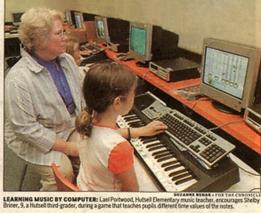
Hutsell Elementary youngsters discovered that a computer can release their creative energies allowing them to learn to play the piano.
They used a program called Soft Mozart developed by Houston resident Hellene Hiner.
Using computers and electronic keyboards, pupils in grades K-5 built musical skills during the half-year program. It will be offered a full year beginning in August.
The program had 23 pupils but can serve as many as 30, said teacher Lael Portwood.
Pupils were divided into two groups, and half attended Monday and Wednesday sessions and the other half received hourly instruction on Tuesdays and Thursdays.
Soft Mozart, an interactive computer software program, encourages children to acquire music skills much like they gain fluency in language, according to Hiner, who boasts children as young as 3 can learn how to interpret sheet music using this method. The software program is structured to allow users to program virtually any song and then learn the notes.
By the end of the year, pupils were playing several pieces even though the program began only in January, Portwood said.
By connecting a keyboard with about 25 percent fewer keys than a traditional piano to a personal computer, participants learn to play piano. Color-coding the keys on the keyboard to correspond with the music notes shown on the computer monitor makes it more engaging for pupils, Hiner said.
"Children use colored pictures and flash cards to help them recognize and learn musical notes instantly," Hiner said.
Portwood believes young children can become bored with traditional teaching methods, and this program captures their attention and keeps them hooked. Because of the modern technology adept society, pupils are accustomed to using the computer as a learning tool, Portwood said.
The program is funded through a $100,000 21st Century Community Learning Center grant administered by the Harris County Department of Education.
"The grant is designed to provide opportunities for enrichment programs beyond the school day," said Keiko Davidson, the school's principal. "Schools with a significant underprivileged population can apply for these grants."
Hutsell qualified because more than 55 percent of its 850 pupils were enrolled in the free and reduced-cost lunch program.
Academic success
Hiner, who was born in the Ukraine and later moved to what is now St. Petersburg, Russia, before moving to the United States in 1993, said the program is sold over the Internet, but her main thrust is to get it into public schools.
Research shows that learning to read music and play an instrument can boost academic achievement in other areas, Hiner said.
"Sadly, in most public schools music and art are usually the first things eliminated when there are funding issues," she said.
Davidson shares Hiner's belief that instruction in fine arts is critical to a child's overall academic development. She said Hiner's revolutionary methods had a profound effect of her daughter's education. Davidson became impressed when Hiner taught her daughter, Carolyn, and was eager to try the music instruction method.
Carolyn Davidson, who just graduated third in her class at Mayde Creek High School, began piano lessons eight years ago with Hiner and has gained the mastery of one who has studied for 15 years, her mother said.
"All children should be given the opportunity for music instruction," Davidson said,
In 2002, Hiner developed and premiered the Soft Mozart piano teaching method along with partner Valeri Koukhtiev, who focused on creating the technology element of the program. It took about 25 years to fully develop and implement, Hiner said.
She doesn't see the program as a threat to the traditional way of teaching the piano but instead thinks music teachers will find it more productive.
"It's not just about being faster, it's about being thorough," Portwood said.
"Many parents don't realize there is a more affordable option for teaching the piano. In just a few months, students can play several songs." Hiner said.
She was inspired to develop Soft Mozart because of her initial failure as a music pupil. She found it difficult to understand the lessons and wound up frustrated and disinterested. It was only after her parents removed her from school that she discovered she had perfect pitch and the ability to name any chord or tone by ear.
News on KXAN-TV 36, Austin, Texas - November 7th, 2004
 Impressed by students' performance, a popular Austin journalist Jim Swift and his crew from KXAN-TV News visited Hellene Hiner's piano studio. Read and watch the "On The Porch" segment in the 10 p.m. newscast.
Impressed by students' performance, a popular Austin journalist Jim Swift and his crew from KXAN-TV News visited Hellene Hiner's piano studio. Read and watch the "On The Porch" segment in the 10 p.m. newscast.
Hellene Hiner becomes a client of Solters & Digney PR - May 19th, 2004
One of the oldest and most respectable of the Public Relation firms, Solters & Digney PR, celebrated its 50th anniversary. In the astonishing list of its clients you can find famous names from Broadway and Wall Street, actors and singers, authors and athletes. 26 years with Frank Sinatra, 33 years with Barbra Streisand, Michael Jackson, Ray Charles and many other successful names and events are connected with the name of Solters & Digney PR.
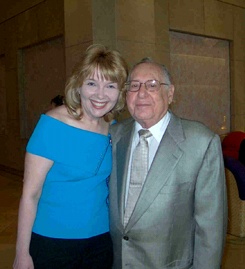 |
|
|
|
Hellene Hiner with Lee Solters |
|
Pat Boone, Hellene Hiner, Lee Solters and Tonya Billingsley |
Hellene Hiner became a client of the Solters & Digney PR seven months ago, after she gave presentation of her program to Lee Solters, a living legend of PR business, and he really has believed in the future of Soft way to Mozart. And of course, Hellene Hiner accepted an invitation to the Anniversary Celebration Luncheon at the Beverly Hilton Hotel, Beverly Hills
"Piano is easier to learn than any other instrument, and is even easier to learn than singing. Some people can't sing. Everyone can play piano." - Hellene Hiner.
Piano Teacher's Software Hits All the Right Notes - February 19, 2004
An article by Bill Breslin in Houston Chronicles, Thursday, February 19, 2004. ![]()
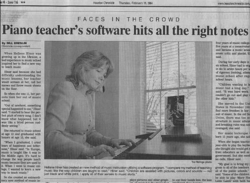 When Hellene Hiner was growing up in the Ukraine, a bad experience in music school inspired her to find a new way to teach music. Hiner said because she had difficulty understanding the music lessons, her teacher would scream at her, call her names and throw music sheets on the floor. So when she was 11, her parents took her out of music school.
When Hellene Hiner was growing up in the Ukraine, a bad experience in music school inspired her to find a new way to teach music. Hiner said because she had difficulty understanding the music lessons, her teacher would scream at her, call her names and throw music sheets on the floor. So when she was 11, her parents took her out of music school.
"Out of nowhere, something special happened to me," Hiner said. "I started to hear the perfect pitch of every song. I don't know what happened, but it was like a blind person suddenly seeing."
She returned to music school at age 12 and graduated with honors at age 15. "When I graduated, I cried tears of happiness and bitterness," Hiner said. "Worldwide, music is taught like it was in the Middle Ages. It's hard to change the way people teach music because they are used to it. When I went to music college, I wanted to learn a new way to teach music."
So she created an extraordinary new method of music instruction called Soft Mozart, utilizing a software program with the same name.
"I compare my method of teaching music like the way children are taught to read," said Hiner, who lives in northwest Houston. "Children are assisted with pictures, colors, and sounds- not just black and white print. I apply all of their senses to music study."
"Music teachers today are teaching music utilizing the students' logical side of the brain," she said. "They begin by explaining the music, like defining the treble and bass clefs," she said.
Hiner's students start right off by playing the musical instrument and learn by playing music, she said. A keyboard is hooked up to a personal computer. Hiner, who said she gives private lessons to about 50 students, color codes the keys on the keyboard to correspond with the lines of music displayed on the computer monitor. The interactive software displays pictures and other graphics, all related to the music that helps the student along.
"I have students as young as 2-years-old," she said. "Children this young are capable of playing the keyboard with both hands - and they love it." She said playing the keyboard helps young children to develop their fine motor skills.
"People today don't use their hands as much as they did in the 18th and 19th centuries," Hiner said. "I relate the amount of hand use with intelligence." She said as people continue to use their hands less, the less intelligent they become.
Hiner said she thinks kids today have the same music literacy as people in the Middle Ages had reading literacy. "I think we need to teach children music, so they can express themselves musically and learn music as a language," she said.
Hiner was born in St. Petersburg, Russia, and moved to Ukraine about 4 years later. She had 16 years of music education in the Ukraine - seven years of music school, four years of music college and 5 years at a conservatory - and became a music scientist, music critic and pianist. During her early days in music school, Hiner had to engage in six to seven hours per week of rigorous training, attending a music school after regular school hours. "Children wanting to learn music had a long day," she said. "It was hard work. You couldn't go out and play with the other kids."
She moved to the Unites States in November 1993 to find more freedom in her pursuit of music. In the old Soviet Union, there was too much structure in music education and breaking rules was not encouraged, she said.
Her music technique was born 15 years ago, she said. When she began teaching 2-year-olds to play the keyboard, she thought she would get calls from educators as well as the government. But she received no calls.
"My goal is to bring my program to all of the public schools," she said. "Some of the children will be able to play 'Mary Had A Little Lamb' with both hands at the end of the first class, and some of them will play something more advanced." They will also be able to read treble and bass clefs, she said.
"Piano is easier to learn than any other instrument, and is even easier to learn than singing," Hiner said. "Some people can't sing. Everyone can play piano."
WB-39 News - October 11th, 2002
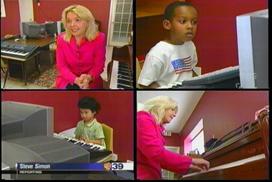 In October 11th, 2002, the Program was featuring in WB-39 News. Steve Simon, well known Houston reporter, got interested in the program and visited our school with his TV-crew. He had not only momentarily grasped advantages of new method but succeeded to pack main principles of it in his talented reportage.
In October 11th, 2002, the Program was featuring in WB-39 News. Steve Simon, well known Houston reporter, got interested in the program and visited our school with his TV-crew. He had not only momentarily grasped advantages of new method but succeeded to pack main principles of it in his talented reportage.
Here are some extracts from this report:
WB-39-You know learning to play the piano may never be the same. A local entrepreneur has figured out a way to get kids to enjoy sitting in front of the keyboard. Can you believe it? As Steve Simon tells us in this week's WB Interactive, software makes it possible.
Steve Simon-This takes years of practice. It's hard work. But what would happen when you take some kids and let them think playing the piano is like playing a video-game? You get music. This is DoReMiFaSoft. The soft is for computer software that is helping little ones hit those big notes. Desire here is just four years old.
Hellen Hiner-It works really fast and really effective, like I have some ten years old, nine years old kids who in one lesson start to play with both hands several songs.
Steve Simon-Notice how the musical lines start out vertically. Gradually, the pictures are replaced by notes, and the musical lines go to that standard left to right.
Hellene Hiner-I want this program in public schools. I want children who has no money or low income but big talent to be exposed to the music.
Hellene Hiner had her first appearance on the Debra Duncan show (ABC, Houston) on April 10, 2000.
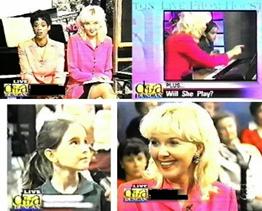 She went to Channel 13 a couple weeks before the show with the video tape of her 2 and 3 year old students playing piano. She was lucky that day to meet a well known T.V. journalist (and her hero), Marvin Zindler, who listened to her ideas with a great deal of curiosity and attention. Marvin Zindler was the one who took her to the supervising producer of the Debra Duncan show and advised demonstrating her teaching methods on live T.V.! The idea to teach a randomly selected child to play piano with two hands in twenty minutes during the show had been born.
She went to Channel 13 a couple weeks before the show with the video tape of her 2 and 3 year old students playing piano. She was lucky that day to meet a well known T.V. journalist (and her hero), Marvin Zindler, who listened to her ideas with a great deal of curiosity and attention. Marvin Zindler was the one who took her to the supervising producer of the Debra Duncan show and advised demonstrating her teaching methods on live T.V.! The idea to teach a randomly selected child to play piano with two hands in twenty minutes during the show had been born.
Nobody knew how the experiment would turn out. After the crew had visited a school and saw the students, most of them became believers that something special can happen. The results surprised even them. Little 6 year old Ashley, who was picked out of the audience, confessed she had never taken piano lessons before. She was able to play the Hanon #1 exercise and Ludvig Bethoven's "Ode to Joy" with all ten fingers of both hands at the end of the show.
Music Teacher Strikes Chord with Theory for Teaching Tots - March 10th, 1997.
Business Journal published an article about Hellene Hiner's program:
"... Hiner's theory speculates that 100 percent of all babies are born with musical talent of some kind but that the talent is lost by the age of 5 or 6 if it is not developed..."
end faq
Photo Gallery
Coming soon. Please check back later.
Чем занимаемся
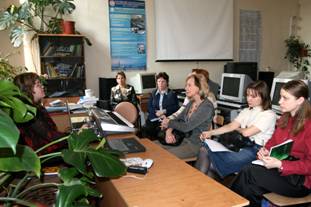 |
|
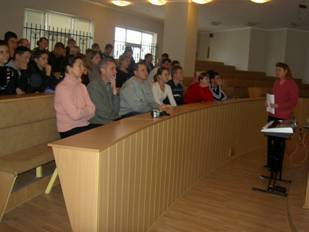 |
|
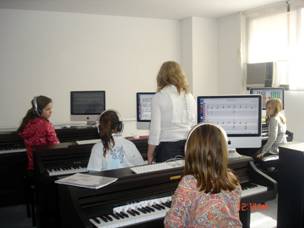 |
|
Компания Music Vision International разрабатывает, производит и продвигает музыкально-образовательное программное обеспечение по всему миру. MVI распространяет свою продукцию как на CD-ROMах по обычной почте, так и напрямую через интернет: купив программу, вы можете скачать ее. Кроме того, помимо самой программы MVI предоставляет лицензию на нее и учебный план для преподавателей "Soft Way to Mozart".
Soft Mozart - это уникальный инновационный курс. Он базируется на научных исследованиях, которые велись более 30-ти лет. Все они были посвящены эффективности методов обучения игре на фортепиано и чтения нот с листа. Запатентованный метод Soft Mozart делает музыкальное обучение естественным и приятным. Soft Mozart сразу же погружает учеников в увлекательный мир игр, которые ненавязчиво знакомят их с основами нотной грамоты: нотным станом, нотами и многим другим. При этом, никто не тратит время на скучные лекции и длинные объяснения из музыкальной теории.
В дополнение к программам Soft Mozart компания MVI разработала специальный учебный курс "Soft Way to Mozart", имеющий богатый послужной список. В самой престижной консерватории мира, Московской консерватории, основанной Петром Ильичом Чайковским, признают эффективность наших программ и учебного курса "Soft Way to Mozart". Московская консерватория недавно выпустила книгу для педагогов "Как учить сольфеджио в XXI веке".
Метод упрощенного представления нотного текста был разработан компанией MVI на основе данных, собранных в течение 10 лет тестирования программы Soft Mozart. Учебный курс "Soft Way to Mozart" преподается в нескольких колледжах и университетах в России и Испании в качестве нового предмета. Программу Soft Mozart уже приобрели в 48 странах мира. Музыкальные педагоги из, как минимум, 14-ти стран сегодня с удовольствием используют нашу программу на своих занятиях.
Учебный курс "Soft Way to Mozart" успешно применяется для обучения музыке детей по всему миру. Он дает хорошие базовые навыки новичкам и предлагает уже продвинутым ученикам эффективный метод дальнейшего совершенствования и повышения их квалификации. Возможно, самый важный аспект учебного курса "Soft Way to Mozart" состоит в том, что вам не нужен наставник или педагог, чтобы следовать курсу. Любой, у кого есть компьютер, может помочь новичку научиться играть на фортепиано и читать музыку с листа. Для обучения детей младше 5 лет все-таки потребуется присутствие взрослого, чтобы установить и авторизовать программу.
